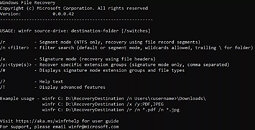Monday, June 29th 2020

Microsoft Seemingly Introducing File Recovery Tool in Future Windows 10 Update
Microsoft seems to be on the verge of introducing a new file recovery tool in a future Windows 10 update. The news, courtesy of The verge, paints a MS-DOS-based tool that would allow users to recover most of the "basic" files they'd be looking for after accidental deletion: MP3 files, MP4 videos, PDFs, JPEG images, and Office, Word as well as PowerPoint documents. The File Recovery Tool is already available as a download from Microsoft's app store (and requires Windows 10 version 19041.0 or higher).
The lack of a GUI could be a put-off for some users; but again, this is a free tool from the company. As a refresher, a file isn't fully deleted if you only use Windows' "delete" function - even if you delete it from the Recycle Bin afterwards. All that does is tell the OS that that those particular storage addresses are available for being written to again - the bits that the file is made of are still there. This is the reason why successful file recovery depends mostly on whether or not new information has been written to those particular cells again. If it has, chances to recover your data are slim.
Sources:
Windows File Recovery, via The Verge
The lack of a GUI could be a put-off for some users; but again, this is a free tool from the company. As a refresher, a file isn't fully deleted if you only use Windows' "delete" function - even if you delete it from the Recycle Bin afterwards. All that does is tell the OS that that those particular storage addresses are available for being written to again - the bits that the file is made of are still there. This is the reason why successful file recovery depends mostly on whether or not new information has been written to those particular cells again. If it has, chances to recover your data are slim.

26 Comments on Microsoft Seemingly Introducing File Recovery Tool in Future Windows 10 Update
I will state that I think the NSA has been stepping back from those activities lately given the public backlash, but that's just opinion, mostly.
I did see some firmware level rootkits that are supposedly NSA grade stuff, one of them is documented here. But I found no evidence linking the actual culprit to the NSA, more to somewhere more... eastern if anything.Good on you.